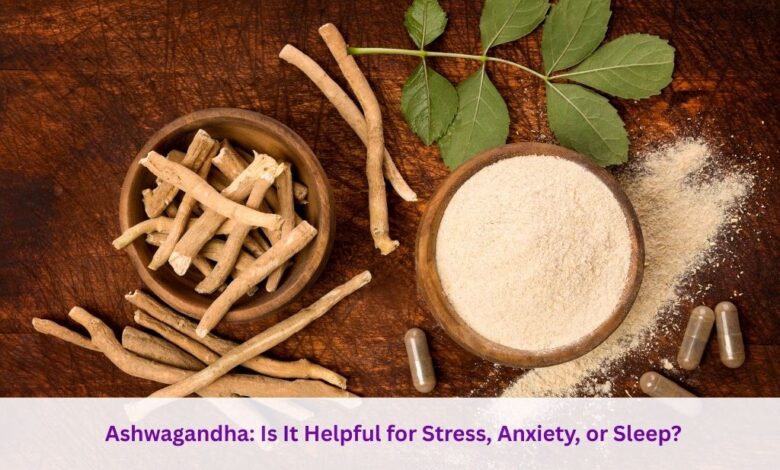🌿 Ashwagandha: Is It Helpful for Stress, Anxiety, or Sleep?

Introduction: The Ancient Herb for Modern Stress
In a world where stress, anxiety, and sleepless nights are on the rise, many people are turning toward natural remedies instead of synthetic medications. Among these, Ashwagandha (Withania somnifera) — an ancient Ayurvedic herb also known as Indian Ginseng or Winter Cherry — has become one of the most talked-about adaptogens in modern wellness.
But does Ashwagandha truly live up to its reputation as a stress-buster and sleep enhancer? Can it really help with anxiety, insomnia, and mental calmness? This in-depth article explores the science, benefits, dosage, and safety of Ashwagandha — so you can decide if it deserves a place in your daily routine.
What Is Ashwagandha?
- Botanical name: Withania somnifera
- Traditional use: In Ayurveda for over 3,000 years
- Category: Adaptogen → helps the body adapt to stress
- Active compounds: Withanolides, alkaloids, and saponins
Ayurvedic texts describe Ashwagandha as a “Rasayana” — a rejuvenator for mind and body, promoting strength, vitality, and longevity. In modern times, researchers are studying its ability to regulate cortisol (the stress hormone), improve resilience, and enhance overall well-being.
The Stress & Anxiety Epidemic
Before diving into how Ashwagandha works, let’s understand why it’s in such high demand today.
- Stress statistics: According to WHO, nearly 1 in 4 people worldwide experience stress or anxiety disorders at some point.
- Sleep problems: Over 30% of adults suffer from insomnia or poor sleep quality.
- Modern lifestyle triggers: Work pressure, digital overload, financial worries, and health challenges.
Traditional medications like benzodiazepines or sleeping pills may provide short-term relief but come with side effects like dependence, drowsiness, and memory issues. Hence, people are looking for safe natural solutions like Ashwagandha.
How Ashwagandha Works in the Body
Ashwagandha is not a sedative; instead, it works by balancing the body’s stress response system. Its main actions include:
1. Regulating Cortisol Levels
- Cortisol is the “fight-or-flight” hormone.
- Chronic stress keeps cortisol high → leading to anxiety, poor sleep, and even weight gain.
- Studies show Ashwagandha can lower cortisol by up to 30%, helping restore calm.
2. Supporting the Nervous System
- Acts on GABA receptors (like anti-anxiety medications do).
- Helps reduce overactivity in the brain → less nervous tension.
3. Promoting Hormonal Balance
- Stress disrupts thyroid and reproductive hormones.
- Ashwagandha supports thyroid function and may boost testosterone and fertility in men.
4. Improving Sleep Quality
- Encourages natural relaxation, not heavy sedation.
- Increases deep non-REM sleep, making you feel refreshed.
Scientific Evidence: What Do Studies Say?
Ashwagandha for Stress
- A 2019 study in Medicine (Baltimore) found participants taking 300 mg/day of Ashwagandha root extract had significant reductions in stress and cortisol compared to placebo.
Ashwagandha for Anxiety
- A 2012 randomized controlled trial reported a 56% reduction in anxiety symptoms among those supplementing with Ashwagandha compared to only 30% in placebo.
Ashwagandha for Sleep
- A 2020 study in Cureus Journal showed Ashwagandha improved both sleep quality and sleep onset latency (time taken to fall asleep).
Benefits of Ashwagandha Beyond Stress Relief
Ashwagandha isn’t limited to mental health. Research suggests it may also help with:
- Boosting energy & stamina
- Enhancing memory & cognitive function
- Supporting immunity
- Improving sexual health & fertility
- Reducing inflammation & oxidative stress
- Managing blood sugar & weight
Dosage & How to Use Ashwagandha
The correct dosage depends on the extract and purpose.
- Stress & Anxiety: 250–600 mg/day (standardized extract with ≥5% withanolides)
- Sleep: 300–500 mg before bedtime
- General vitality: 250–500 mg daily
Forms Available
- Capsules/Tablets (most common)
- Powder (Churna) → mixed in milk, honey, or smoothies
- Liquid extracts & tinctures
⚠️ Tip: Always check for a reputable brand with standardized extract to ensure potency.
Safety, Side Effects & Precautions
Ashwagandha is generally safe but may cause mild side effects in some:
- Stomach upset
- Drowsiness
- Headache
Who Should Avoid?
- Pregnant & breastfeeding women
- People with autoimmune diseases (e.g., lupus, rheumatoid arthritis)
- Those on thyroid or blood pressure medication (consult doctor first)
Comparing Ashwagandha with Other Remedies
| Remedy | Benefits | Limitations |
|---|---|---|
| Ashwagandha | Reduces stress, balances cortisol, improves sleep | Needs consistent use, not instant |
| Valerian Root | Helps sleep | May cause grogginess, not for long term |
| Melatonin | Regulates sleep cycle | Works best for jet lag, not daily stress |
| Pharmaceuticals | Strong effect on anxiety & sleep | Dependency, side effects |
Real-World Testimonials
Many users report that Ashwagandha makes them feel calmer during the day and helps them fall asleep faster at night without the grogginess of sleeping pills. While results vary, consistency (at least 6–8 weeks) is key for noticeable benefits.
FAQs About Ashwagandha
Q1: How long does it take for Ashwagandha to work?
👉 Most studies show results in 6–8 weeks, though some feel calmer within days.
Q2: Can I take Ashwagandha daily?
👉 Yes, daily use is safe for most people, but cycle off after 3–6 months if using high doses.
Q3: Does Ashwagandha make you sleepy in the daytime?
👉 No, it usually reduces anxiety without sedation. Some may feel mild relaxation.
Q4: Can I combine Ashwagandha with coffee or tea?
👉 Yes, though combining with caffeine may reduce its calming effects.
Q5: Is Ashwagandha addictive?
👉 No, it’s not habit-forming, unlike benzodiazepines or sleeping pills.
Conclusion: Should You Try Ashwagandha for Stress, Anxiety, and Sleep?
Ashwagandha is one of the most researched adaptogens available today. Backed by both Ayurvedic wisdom and modern science, it shows strong potential to help reduce stress, calm anxiety, and improve sleep quality — without the harsh side effects of synthetic drugs.
If you are struggling with chronic stress, restless nights, or anxiety, Ashwagandha may be a safe, natural, and effective solution worth considering. However, it works best as part of a holistic lifestyle — including healthy diet, exercise, and mindfulness practices.




